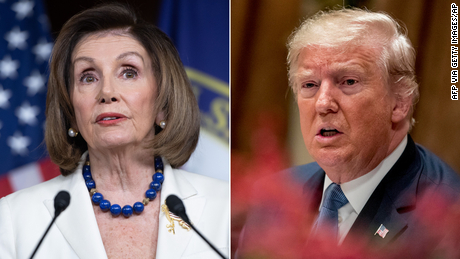
Don’t miss what happened in Washington on Thursday morning: House Speaker Nancy Pelosi virtually guaranteed that President Donald Trump will be only the third president in American history to be impeached by the House.
“Sadly, but with confidence and humility … today, I am asking our chairman to proceed with articles of impeachment,” said Pelosi just after 9 a.m. ET.
With those words, Pelosi formalized the likelihood of an outcome that had been anticipated from the day earlier this fall when she blessed the impeachment inquiry surrounding Trump’s conduct toward Ukraine. By announcing that formal articles of impeachment will begin to be drawn up by the House Judiciary Committee, Pelosi is taking a big step toward the expected end goal of a floor vote to impeach Trump. And given the Democrats’ majority in the House — and the likelihood of few, if any, defections on the vote — impeachment is now a near-certainty.
Yes, as I just noted, this is an outcome that everyone who knew anything about the way Pelosi (and Washington) works has expected for months now. But it’s still a hugely important historical marker that, no matter how it ends up, will be one of the major moments (if not the major moment) of Trump’s presidency.
We’ve had 44 presidents. (Grover Cleveland was president twice in non-consecutive terms, making it so that Trump is the 45th president.) Only two — Andrew Johnson and Bill Clinton — have been impeached by the House. Assuming Trump’s name is added to that ignominious list between now and the end of the year, it will mean that — still — less than 7% of all the people who have been elected president have been impeached while in office.
Why does it seem like the immediate reaction misses that history-is-being-made-right-in-front-of-us point?
The answer, I think, is that we have become somewhat inured to the whole impeachment thing over the past two decades. When it happened with Bill Clinton in the late 1990s, it was a novel thing. (Johnson had been impeached 130 years before!) And I think a lot of people were surprised that even though Clinton was impeached by the House, he wasn’t thrown out of office. (Yes, if you took notes, only the Senate can do that). When Clinton’s party won big in the 1998 midterm elections — as the public reacted negatively to the Republican House’s impeachment of him — the whole impeachment thing lost more of its luster.
Then consider what happened in the 20 years between that impeachment and this one. A group of (mostly) liberals spent a decent chunk of George W. Bush’s presidency calling for his impeachment for a wide variety of alleged wrongdoing, from the reasoning behind the US going into Iraq to climate change and back. Then came Barack Obama — and Republicans, similarly, demanding that he be impeached for, among other things, his administration’s response to the attacks on the US consulate in Benghazi, Libya.
In short, we’ve been besieged by impeachment threats and chatter for much of the past two decades. At some level then, the public treats the pending impeachment of Trump in the House as a sort of boy-who-cried-wolf scenario. There’s a weariness and a wariness to fully engage because, well, we’ve been down this road before.
While those feelings are understandable, they do gloss over some important realities. Neither Bush nor Obama was ever impeached by the House for their conduct. Neither ever came close to it. What Trump is accused of doing — using American power to forward his own personal and political interests — and the evidence that suggests he did just that are far more substantial than anything we ever saw against Bush or Obama.
So, take a step back. Shrug off your impeachment fatigue. And realize that Pelosi made history on Thursday. Trump is going to be impeached. That’s a very big deal.
As reported by CNN
